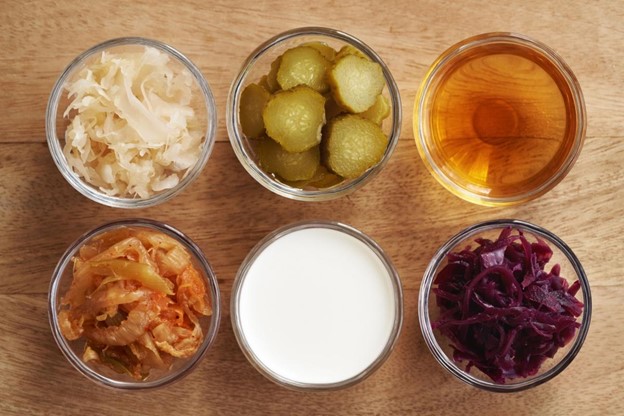Gut health is foundational to overall well-being, influencing everything from digestion to mental health. A balanced gut can improve various bodily functions, making it a priority for anyone aiming for a healthier lifestyle. One of the most effective ways to enhance gut health is through the consumption of probiotic foods, which are rich in beneficial bacteria that help maintain a balanced gut microbiome.
As one of the leading gastroenterological and hepatological health providers, we at Nirvana Healthcare Network want to arm you with the information you need to be good to your gut so it can be good to you. Check out our helpful guide on the best probiotic-rich foods to start incorporating into your diet. Then, if you have any questions or need further treatment for conditions like irritable bowel syndrome or inflammatory bowel disease, do not hesitate to give us a call!
What Are Probiotics?
Probiotics are live microorganisms that, when consumed in adequate amounts, confer health benefits to the host. These beneficial bacteria primarily reside in our digestive tract, forming an integral part of our gut microbiome. The term “probiotic” comes from the Greek words “pro” (promoting) and “biotic” (life), aptly describing their role in supporting life and health.
Benefits of a Balanced Gut Microbiome
The gut microbiome refers to the complex community of microorganisms living in our digestive tract. These microscopic allies work tirelessly to maintain a balanced gut environment by competing with harmful bacteria for resources and space. A balanced gut microbiome supports various bodily functions, from digestion to immune system regulation. Let’s take a deeper look at the benefits of good gut microbiome diversity in your overall health:
- Improved digestion: Probiotic foods help break down food more effectively, reducing bloating and discomfort.
- Enhanced immune function: Probiotic bacteria foster a healthy immune system, making it easier to fight off infections.
- Better mental health: The gut-brain axis links gut health with mental well-being, with a balanced microbiome positively impacting mood and cognitive function.
- Increased nutrient absorption: A healthy gut ensures efficient absorption of vitamins and minerals from food.
How Adding Probiotic Foods Can Keep Your Gut Healthy
While probiotic supplements have gained popularity in recent years, incorporating probiotic foods into your diet offers unique advantages. Probiotic foods provide beneficial bacteria along with the nutrients and compounds naturally present in the food matrix. This synergistic combination can enhance the survival and effectiveness of the probiotics as they travel through the digestive system.
Probiotic foods work to support gut health through various mechanisms. They help replenish and diversify the beneficial bacteria in our gut, which can be depleted due to factors such as stress, poor diet, or antibiotic use. These foods also often contain prebiotic fibers that serve as food for the probiotics, helping them thrive and multiply.
Additionally, the fermentation process involved in creating many probiotic foods can produce beneficial compounds like short-chain fatty acids, which nourish the cells lining our gut and support overall digestive health. Regular consumption of probiotic foods also has been associated with improvements in various health conditions. These include digestive issues like irritable bowel syndrome (IBS), inflammatory bowel diseases, and antibiotic-associated diarrhea.
Top Probiotic Foods to Include in Your Diet
Incorporating foods that contain probiotics into your diet is a delicious way to support gut health. Let’s explore some of the most popular options:
Yogurt
Yogurt is usually the most well-known probiotic food, offering a rich source of beneficial bacteria. The fermentation process involved in making yogurt transforms milk into a creamy, tangy product teeming with live cultures. When choosing yogurt for gut health, opt for varieties that specifically mention “live and active cultures” on the label. Greek yogurt is particularly advantageous, as it undergoes an additional straining process that increases its protein content while retaining its probiotic benefits. Look for plain, unsweetened versions to avoid added sugars that can counteract the health benefits.
Kefir
Kefir is a fermented milk drink that packs a powerful probiotic punch. Originating from the Caucasus Mountains, kefir is made by adding kefir grains (a combination of bacteria and yeasts) to milk. The resulting beverage is tangy, slightly effervescent, and rich in probiotics. Compared to yogurt, kefir typically contains a wider variety of probiotic strains and a higher concentration of good bacteria. Kefir is also often better tolerated by those with lactose intolerance, as the fermentation process breaks down much of the lactose in the milk.
Sauerkraut
This fermented cabbage is a staple in many cuisines. Sauerkraut is rich in probiotics and offers a satisfying crunch. When choosing sauerkraut, opt for unpasteurized varieties found in the refrigerated section of your grocery store. Pasteurization, while extending shelf life, can kill the good gut bacteria. Look for sauerkraut with simple ingredients like cabbage and salt, avoiding those with added preservatives or excessive sodium.
Kimchi
Kimchi, a favorite in Korean cuisine, is a spicy and flavorful fermented vegetable dish that not only supports gut health but also boasts a range of vitamins, minerals, and antioxidants. The diverse array of ingredients in this probiotic powerhouse contributes to its complex flavor profile and nutritional benefits.
Miso
Made from fermented soybeans, miso is a cornerstone of Japanese cuisine. This savory paste is full of probiotics and adds depth of flavor to soups, sauces, and marinades. Miso is also a good source of essential minerals, such as zinc, copper, and manganese, which contribute to overall health.
Tempeh
Another fermented soybean product, tempeh, is a plant-based protein source packed with probiotics. It has a firm texture and nutty flavor, making it a versatile ingredient in various dishes. Unlike tofu, which is made from soybean milk, tempeh is made from whole soybeans that are fermented and pressed into a firm, cake-like texture. Its probiotic content, coupled with its high protein and fiber content, makes tempeh an excellent addition to a gut-healthy diet.
Pickles
Pickles, when prepared through traditional fermentation methods, can be a good source of probiotics. However, it’s important to note that many commercially available pickles are made using vinegar and are not fermented, thus lacking probiotic benefits. Check the ingredient list on their food labels to ensure they’re made without vinegar or preservatives.
Kombucha
Kombucha is a fermented tea beverage that has gained popularity for its potential health benefits, including its probiotic content. This fizzy drink is made by fermenting sweetened tea with a symbiotic culture of bacteria and yeast (SCOBY). The fermentation process creates a variety of probiotic strains, as well as beneficial acids and enzymes. Kombucha offers a refreshing way to incorporate probiotics into your diet, especially for those who may not enjoy other fermented foods.
Traditional Buttermilk
Traditional buttermilk, not to be confused with cultured buttermilk commonly found in supermarkets, is a probiotic-rich beverage. It’s the liquid left behind after churning butter from cultured cream. This tangy drink is packed with beneficial bacteria that can support gut health. Traditional buttermilk is also a good source of vitamins and minerals, including calcium and phosphorus. While it may be harder to find than other probiotic foods, some specialty stores or local farms may offer this nutritious beverage.
Potential Considerations and Precautions
While probiotic foods offer numerous health benefits, it’s important to be aware of potential considerations and precautions. Some people may experience digestive discomfort, such as gas or bloating, when first incorporating probiotic foods into their diet. Begin with tiny amounts and increase your probiotic intake overtime to allow your body to adjust.
Additionally, individuals with weakened immune systems or those undergoing certain medical treatments should consult their healthcare provider before consuming probiotic-rich foods, as the introduction of new bacteria could pose a risk.
Get Your Gut in Gear With Nirvana
Our team of gastroenterology experts can provide personalized guidance on maintaining a healthy gut, addressing specific digestive concerns, and integrating probiotics into your overall health plan. Whether you’re dealing with persistent digestive issues or simply want to optimize your gut health, we’re here to help. Contact us today to schedule a consultation and take the next step towards a healthier, happier gut.

